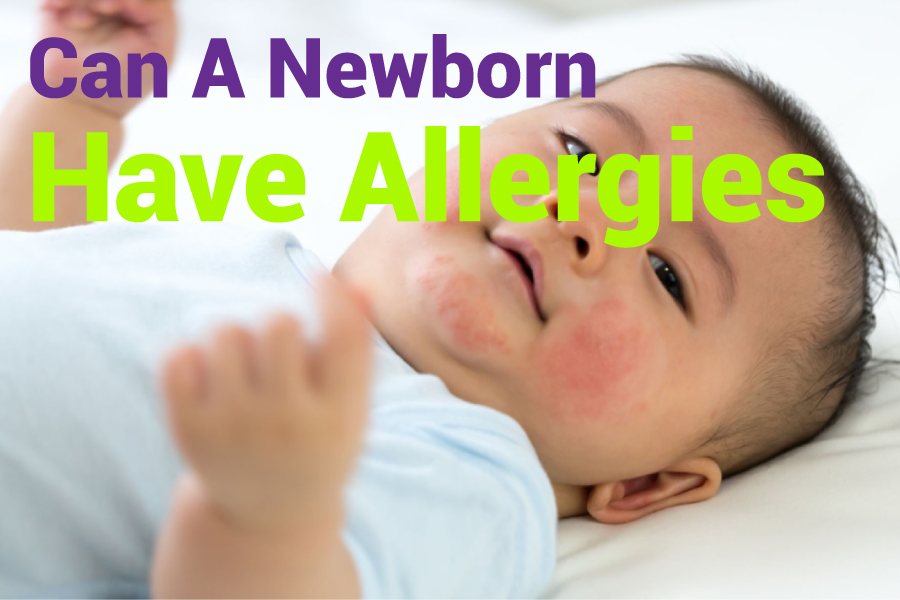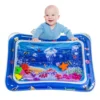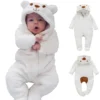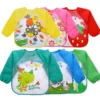Nothing can please new parents more than the vision of bringing up a healthy, bubbly baby. It’s natural to fret over every sneeze or elevating rash or unusual behavior, but especially when one considers the possibility of allergies among newborns. But can a newborn have allergies? Knowing the potential for allergies to develop in infants helps ensure a healthy and comfortable baby. Allergies occur when one’s immune system overreacts to some substance that it perceives as harmful, even though it is usually harmless. These substances, called allergens, can include foods, pollen, dust mites, or even the dander of pets. With a newborn baby, the immune system is just developing; it may, therefore, overreact to foreign substances. It will address whether newborn babies are capable of having allergies, whether one can identify the symptoms, what causes them because of common allergens, and how to manage them well in keeping your little one safe and comfortable.
Can A Newborn Baby Have Allergies?
Yes, a newborn can have allergies. Relatively uncommon, an infant may show sensitivity to various substances. They can also be allergic to foods, environmental agents, and even some medicinal remedies. Typical symptoms range from rashes on the skin and respiratory problems to digestive issues. If you feel that your newborn is showing signs of allergy symptoms, it is best to consult a pediatrician for proper diagnosis and treatment to ensure that there is no misdiagnosis or wrong treatment.
Understanding Newborn Allergies
Allergies in infants are pretty confusing and quite a worrying issue to be more specific, for new parents. While it seems like this tiny baby might have allergies to things, the developing immune systems do have responses to certain allergens. Newborn babies may react to food proteins, pet dander, pollen, or even some fabric or lotions. Diagnosis of these allergies is thus very essential at an early stage of life for proper management and alleviation of symptoms.
One of the most common allergies in infants is food allergy, particularly to proteins in cow’s milk. Such proteins get into breast milk if a lactating woman consumes dairy products, which can then provoke an allergic reaction in an infant. Food allergy symptoms in newborns include skin rashes, gastrointestinal distress, and respiratory problems. Being aware of these symptoms will let the parents seek medical advice in time.
Newborn babies can also be affected by environmental allergens including dust mites and pollen. While the baby may be exposed to a very minimal amount of the same allergen, it can still cause symptoms. Respiratory problems, such as sneezing and coughing, are very common. Wheezing can also occur with skin reactions like eczema. Ensuring that the environment where the baby is kept is clean and free from any allergens can significantly reduce their exposure.
Genetic factors will most likely play a very major role in the possibility of a newborn developing allergies. The risks rise if the parents have a history of allergy, either one or both of them. This genetic predisposition, together with environmental factors, is sure to affect the way allergic reactions may suddenly pop up in infants. The awareness of family history allows the parents and the health care provider to take necessary preventive measures.
Diagnosis of allergy can be quite challenging in a newborn because of the ineffectiveness of his capability to describe the symptoms. Normally, pediatricians depend on the integration of the medical history, physical examinations, and sometimes allergy testing in making a diagnosis. Blood tests or skin prick tests could also be carried out to identify specific allergens. Diagnosis at an early stage, coupled with timely intervention, is paramount for the effective management of allergies.
Management for allergies would include a multi-pronged approach in neonates. Breastfeeding mothers would have to change their diets if there are any suspicions of food allergies. The baby’s surroundings must be kept clean and away from the probable allergens. In some conditions, medications to reduce symptoms may be cautioned and given by pediatricians. Continued observation and periodic visits to healthcare providers would ensure the baby remains healthy.
Common Allergens and Symptoms
1. Food Allergies
Allergic reactions to food proteins, particularly to cow’s milk, eggs, peanuts, and soy, can occur as early as from birth. Allergic manifestations of these allergens are commonly reflected in skin rashes and hives, then eventually developing into gastrointestinal disturbances manifested by vomiting and diarrhea. In severe cases, there might even be anaphylaxis. The mother might also be advised to avoid these foods from her diet if her infant shows allergic manifestations.
2. Environmental Allergens
Dust mites, pollen, mold, and pet dander are common environmental allergens that can also affect newborns. Sneezing, runny nose, cough, and eczema may show up as symptoms. Keeping the living space clean, using an air purifier, and avoiding pets can help minimize these reactions.
3. Contact Allergies
Some fabrics, lotions, and detergents could be responsible for contact allergies in a newborn baby. Such allergies will therefore manifest with symptoms similar to skin irritation, redness, and itching. The selection of hypoallergenic products and mild, perfume-free detergents reduces the potential for skin reactions.
4. Medication Allergies
Though a rare case, newborns can even be allergic to some medications. Rashes, swelling, and trouble breathing can be just some of the symptoms. Always remember to mention any family history of allergic reactions to drugs with your baby’s pediatrician so that he or she can prescribe safe treatment options for your child.
Identifying And Managing Allergies
Identifying allergies in newborn babies involves monitoring their reactions to substances and seeking a doctor’s consultation immediately. The following points are of great significance:
Watch out for common symptoms such as rashes; respiratory ailments; and problems with the digestive system. Record your baby’s contact with potential allergens and the reaction that follows.
In case you suspect it is an allergy, see your pediatrician; he may recommend tests to confirm and detect certain allergens. If it probably is a food allergy, mothers who are breastfeeding should avoid common allergens themselves.
Keep the living environment clean to lessen the entitling dust mites, pollen, and pet dander.
These allergies should be managed before time. Major precautions to be taken include diet alteration, cleanliness of the house, and hypoallergenic materials as well as products. Continuous follow-up with the health provider will ensure the effective management of the baby’s allergy and the growing phase of his life without discomfort.
Alternate View: It Might Be Something Else
While allergies are quite common, there may be other reasons why your baby is showing these symptoms. These can be conditions such as colic, reflux, and common newborn skin issues like cradle cap or baby acne, which at times are considered allergic reactions. Determining the difference between these and allergies is important for correct diagnosis and treatment.
Most often, colic is a digestive discomfort, not an allergy. Some babies suffer from reflux and spit up painfully frequently. While uncomfortable, these do seem to resolve as the baby grows.
Most skin conditions occurring at birth, like cradle cap or baby acne, are relatively harmless and unrelated to allergies. Most of these problems improve with gentle care and time. However, if you are still concerned about the nature of the symptoms your baby is presenting you with, it is always best to consult a healthcare professional to put any worries at rest and reassurance.
Prevention And Long-Term Management
- Breastfeeding and Diet Adjustments: Breastfeeding is beneficial for the newborn in many ways, and one such advantage is that it can prevent allergies. A mother can avoid allergy risks by excluding common allergens from her diet. It should also involve a gradual introduction of solid food to detect if the baby reacts to it.
- Keeping the Environment Clean: Proper cleaning and minimizing allergens can ensure the prevention of allergic reactions. Regular cleaning includes using air purifiers, washing their bedding regularly, and never letting the pet enter the sleeping area of the baby.
- Hypoallergenic Products: Choosing hypoallergenic skin care products, detergents, and clothing materials minimize the potential for contact allergies. Look for products specifically designed for sensitive newborn skin.
- Regular Health Check-Ups: Consultations with pediatricians continuously are the backbone of monitoring and managing allergies. Regular check-ups can monitor the progress of the baby and adjust the management plan accordingly.
Conclusion
Knowing that a newborn can have allergies sets one on the way to keeping them comfortable and healthy. Early recognition of symptoms and consulting healthcare providers, plus preventive measures whenever possible, effectively help in the management of your baby’s allergies. Never hesitate to ask for professional medical advice for an exact diagnosis and hence a developed plan of treatment to keep your newborn safe and happy.
Frequently Asked Questions
Can A Newborn Be Allergic?
Yes, newborn babies can be allergic to a variety of substances, such as foods, their environment, and some medications.
What Are Some Of The Noticeable Symptoms Of Allergies In Newborn Babies?
The symptoms may include skin rashes, respiratory difficulty, gastrointestinal upset, and, in severe cases, anaphylaxis.
How Would I Know If My Newborn Has Food Allergies?
Watch for rashes, vomiting, diarrhea, or respiratory problems after feeding, and consult your pediatrician to know how to test and advise on the same.








